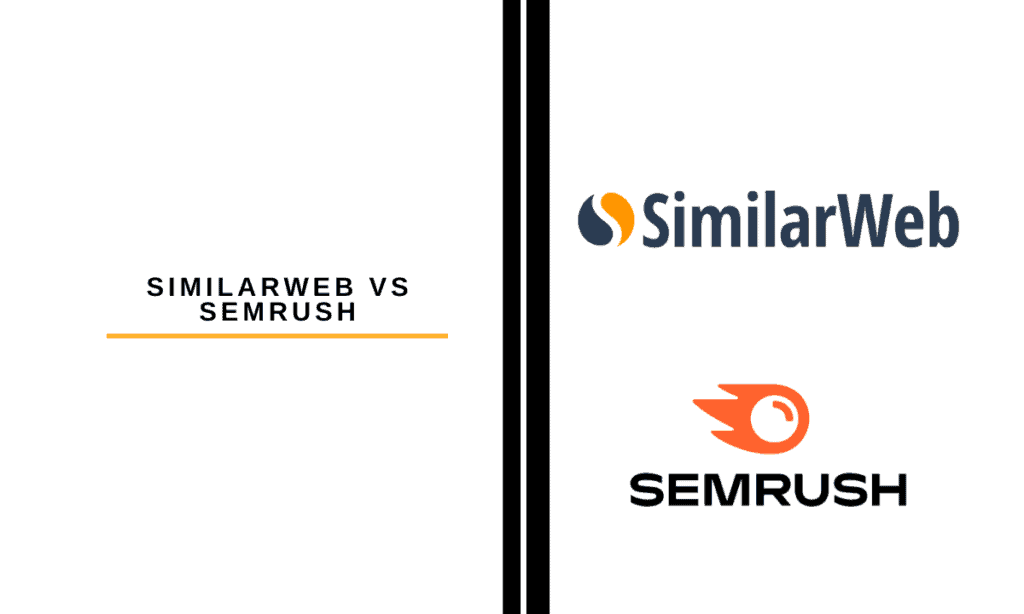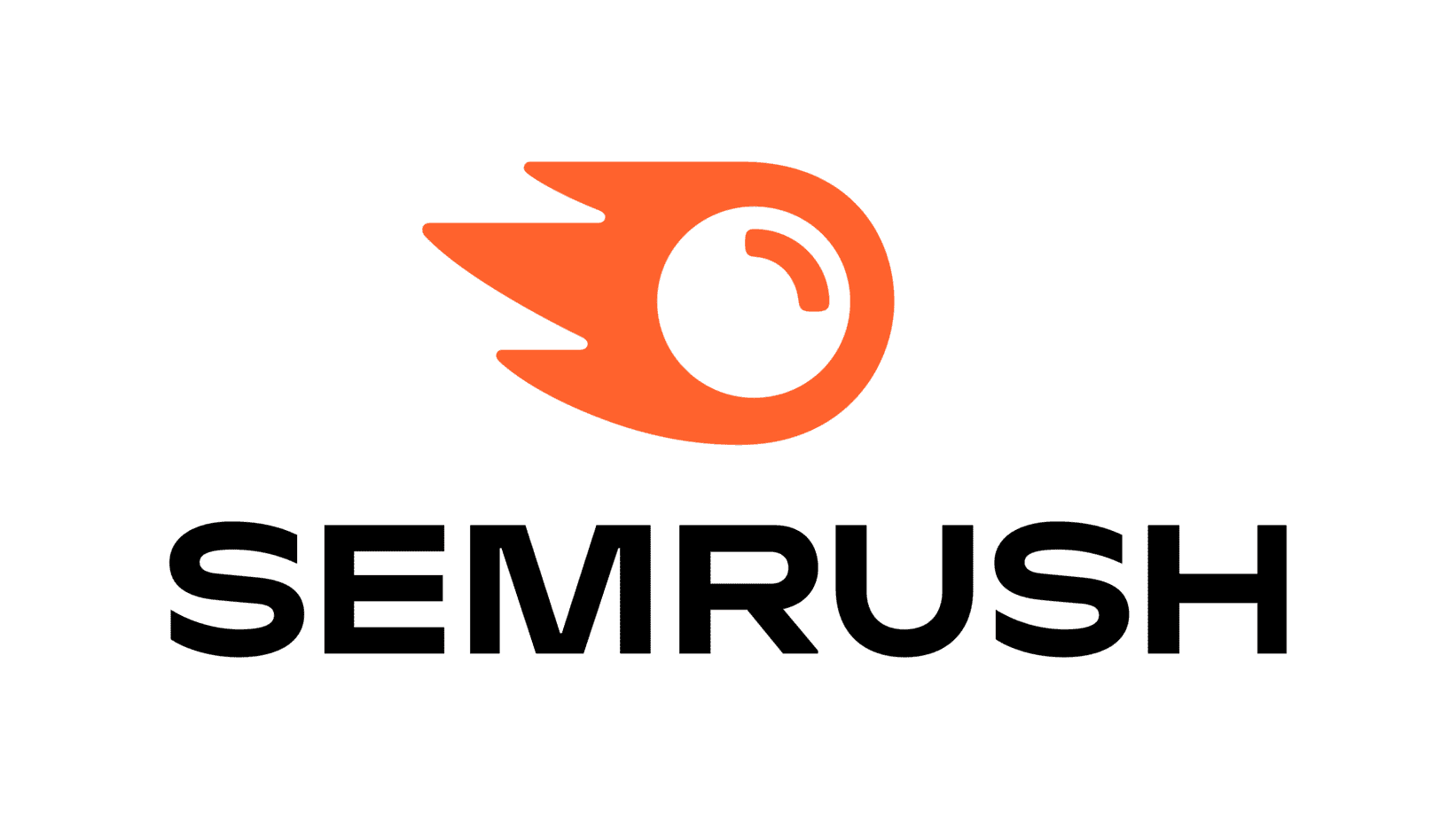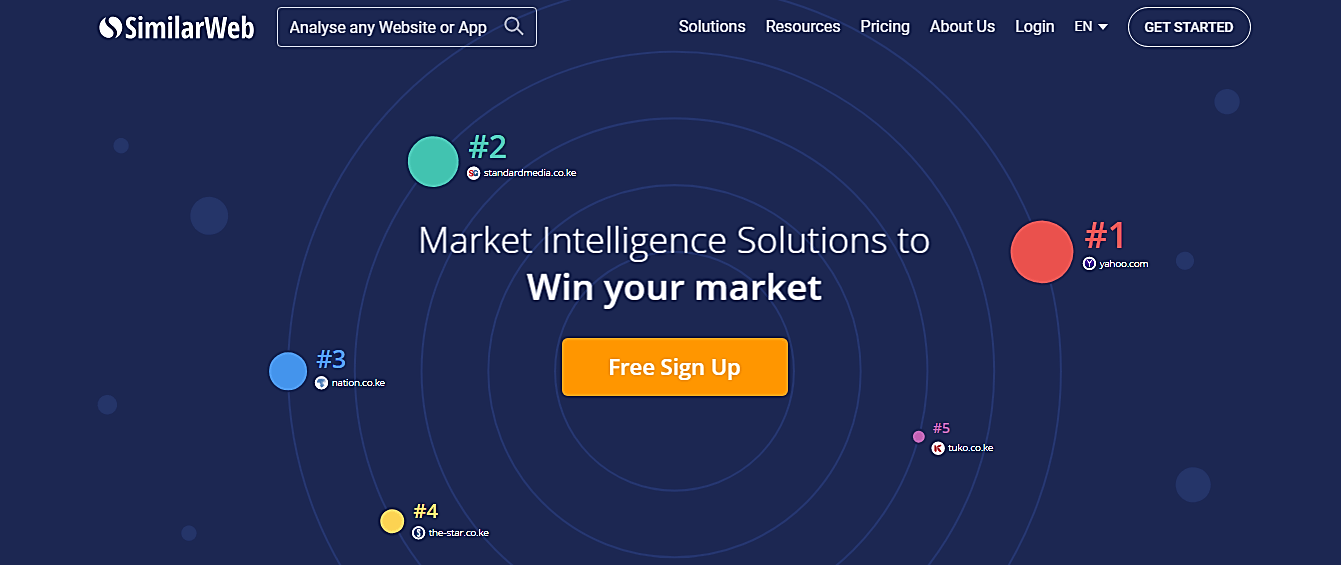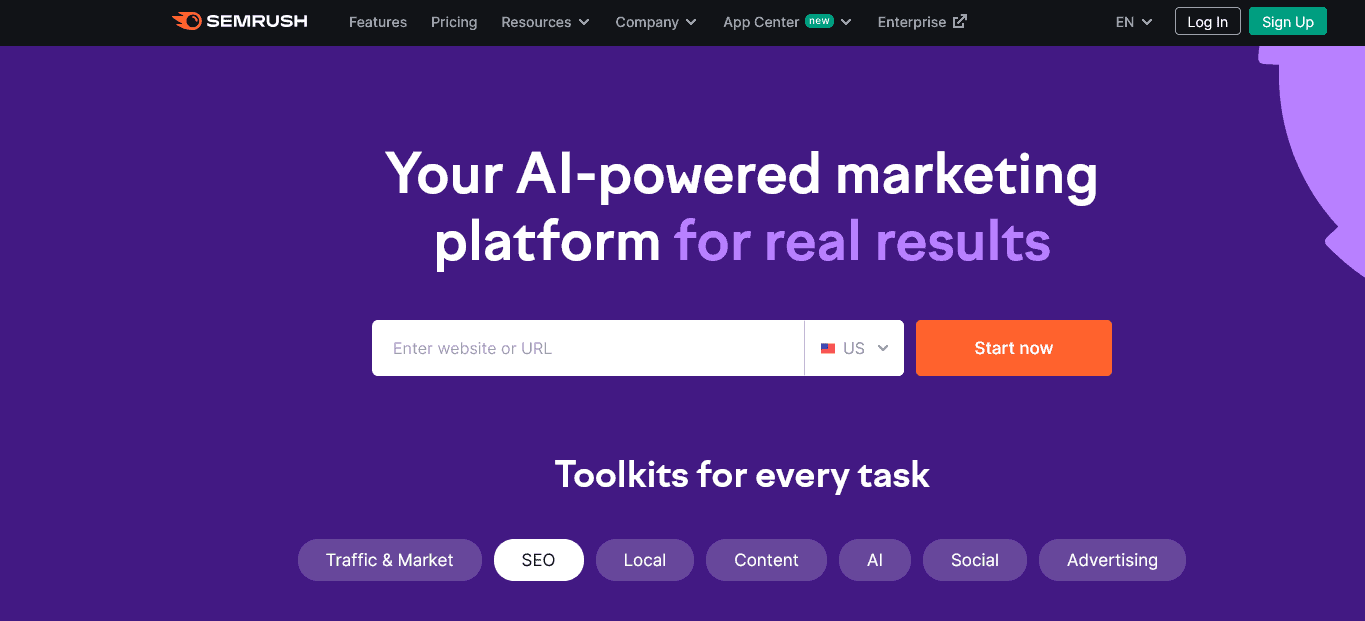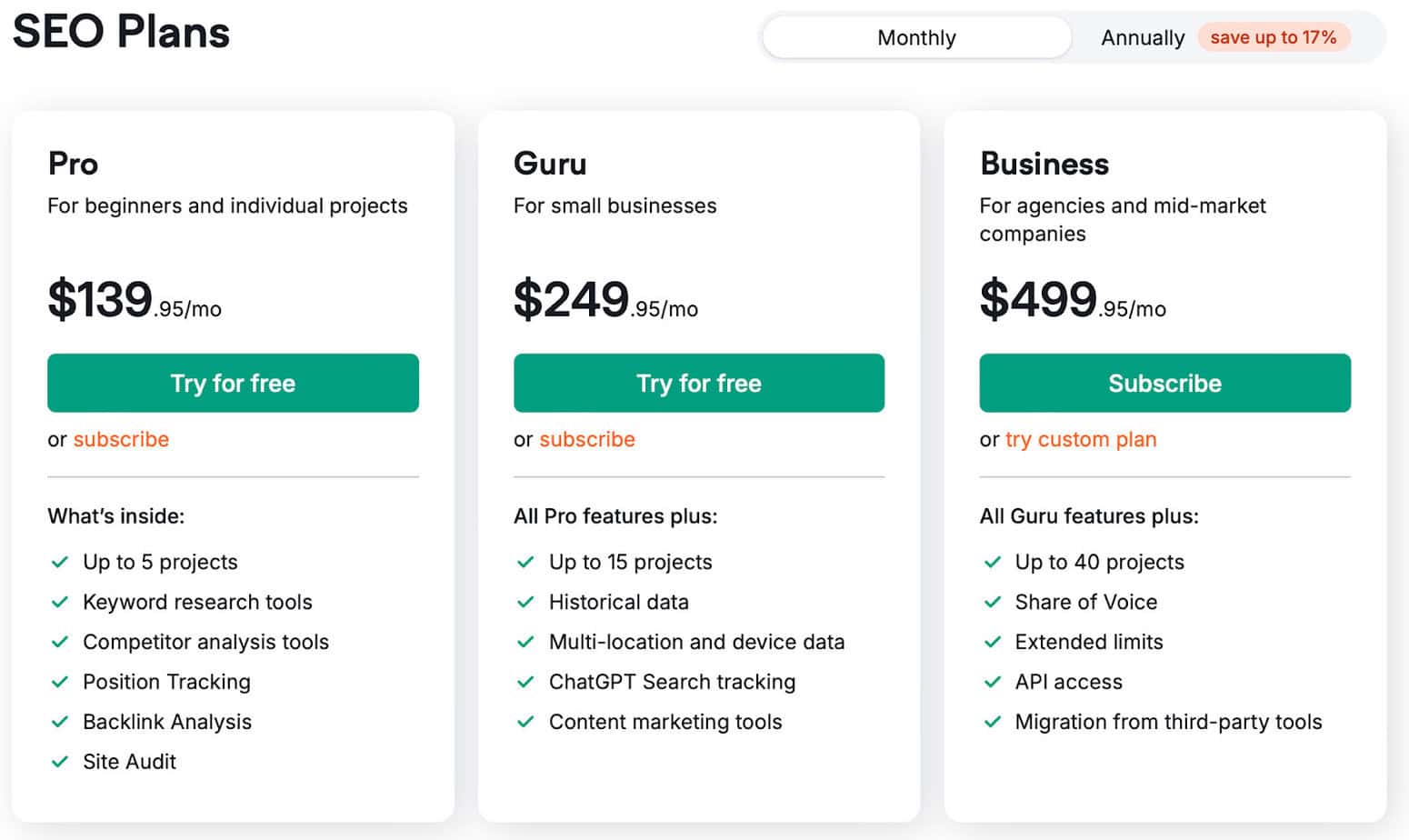Last Updated on August 27, 2025 by Ewen Finser
“If you understand your enemy and understand yourself, you don’t need to fear the outcome of a hundred battles. But, if you understand yourself and fail to know the enemy, you will suffer a defeat for each victorious gain. If you don’t understand neither the enemy nor yourself, you will succumb in all battles.” – Sun Tzu
Success in digital marketing requires knowing your own site and your competitors’. Digital marketing intelligence tools like Semrush and SimilarWeb make this possible with deep website traffic analysis.
Having analyzed these platforms in the past, I was curious to take another look in 2025 with a fresh perspective and an eye on what’s changed.
Bottom Line Up Front Summary: For most SEOs, Semrush is the better option for keyword-based research, technical audits, and full-funnel marketing analysis. If you can take advantage of the 14-day trial for our readers here, it’s a no-brainer to at least test it out. That said, if you are an affiliate manager, brand analyst, or ad buyer looking to reverse-engineer business development or media strategies, Similarweb may be the better fit.
Semrush has generously offered our readers a double extended fully featured FREE TRIAL. Play around with the suite for 2 full weeks to see if it's what you need!
Main Difference Between SimilarWeb vs Semrush
The main difference between SimilarWeb and Semrush is that Semrush offers a comprehensive marketing intelligence suite for online visibility, SEO, PPC, social, content, and competitive analysis. In contrast, SimilarWeb is focused more exclusively on website statistics, traffic benchmarking, and industry-level intelligence.
Feature | Similarweb | |
Best for | SEO, content strategy, technical site audits | Market research, traffic benchmarking |
Strengths | Keyword research, site audits, backlink analysis, AI tools | Competitive benchmarking, audience data, industry-level insights |
Weaknesses | No free plan, enterprise features cost extra | Less tactical SEO support, expensive |
Free Version | 14-day trial (extended with link) | Limited free plan with data caps |
Best use cases | SEOs, agencies, growth marketers | Brand analysts, biz dev, media buyers |
Pricing | From $139.95/month | Custom (often $10K+/yr) |
SimilarWeb vs Semrush: Competitive Analysis Tool Overview
SimilarWeb
SimilarWeb is popularly leveraged as a web measurement and competitive intelligence tool. Through its analytics tools, you’ll be able to keep a close eye on your overall business health, monitor developing opportunities, and progressively improve decision-making processes.
The cool thing is that it extends this assessment to other similar sites. The consequent spying process gathers critical intelligence for benchmarking your site’s performance and learning about proven business techniques, plus new growth opportunities.
In 2025, Similarweb has expanded its focus on enterprise analytics, mobile app performance, and retail eCommerce intelligence, including support for Amazon & Walmart data visibility.
Semrush
Semrush is more of a holistic suite for managing digital marketing. It basically facilitates traffic analysis across several marketing channels, including search, paid ads, social, and referrals, to inform your decision-making processes.
Then, through its auditing tool, marketers can identify possible SEO weaknesses. Rectifying those helps reposition a site in the search engine rankings.
Most importantly, Semrush will help you gain valuable leverage over a rival competitor’s website by providing critical insight into their digital marketing campaigns, plus subjects that interest your target customers.
As of 2025, Semrush also includes AI-powered tools for content planning, link building, competitor benchmarking, and local SEO, along with dedicated modules like Market Explorer, EyeOn, and Traffic Analytics.
SimilarWeb vs. Semrush: Features
Category | SimilarWeb | |
Keyword Research | Keyword Magic Tool, clustering, PPC/SEO split, 25B+ keywords | SimilarWeb allows you to research up to 200 keywords per query for traffic share and landing page performance, but it lacks a true keyword position tracking system like Semrush’s |
Site Audits | Full SEO site audits (140+ checks), health scoring | Not available |
Traffic Analysis | Traffic sources by channel, device, and geo | Traffic benchmarking by industry, site, device, geo |
Competitor Analysis | Market Explorer, Audience Overlap, EyeOn for real-time changes | Deep session analysis, traffic source breakdowns, audience crossover |
Ad Intelligence | Google Ads insights, ad copy benchmarking, PPC keyword audit | Display, video, and search ad tracking |
Backlink Analysis | Detailed backlink profile and audit | Limited to top referrers only |
Social Media Tracking | Tracks competitor posts, engagement, scheduling tools | Limited to social traffic sources only |
Mobile App Insights | Not available | Tracks app performance in App Store and Play Store |
Content Tools | AI Content Planner, SEO Briefs, optimization suggestions | No content-specific tools |
User Access & Reports | PDF reporting, multiple user access (depending on plan) | Reports with Excel export, user limits based on plan |
Pricing Model | Tiered plans from $139.95/month (14-day trial available) | Custom pricing, free tier available, enterprise starts ~$10K/year |
Data Collection
Where Does Semrush Get Its Data?
This is a common question I see. It makes sense if you are trying to narrow down which tool to use.
So where does Semrush get their data?
The answer is a bit shrouded in proprietary mystery. Semrush states that they get their data from “machine learning algorithms and trusted data providers”. But what does this mean?
While there’s no definitive confirmation for what data is collected or acquired, some solid conjectures include:
- Its own customer database of hundreds of customers and their integrated analytics + search console activity: This likely provides a base model for Semrush to make estimations of other sites (that aren’t a customer or data user). In this way Semrush becomes a self-reinforcing data set. The more people use Semrush, the more accurate the data becomes (in theory).
- Google’s API: This is commonly available and forms a general reference point. Basically this is the data you might find in the Google Keyword Planner.
- Clickstream Data: This is actually confirmed by Semrush and is a very common source. Clickstream data is aggregated to essentially “tell the story” of a user journey as they click through the web. This data is also provided by Search Engines (including Google), IT & telecom companies, advertising networks, and internet service providers (ISPs).
- Google Ads & Google Shopping Ads: Semrush analyzes publicly available ad copy and clickstream behavior to model PPC activity. It does not get direct access to Google Ads data unless a user links their own account. Estimates are based on aggregate behavioral data rather than data purchased from Google.
Where Does Similarweb Get Its Data?
Similarly, if you are trying to judge the accuracy of Similarweb, or just see if it pulls in different data sources than you already have, understanding where Similarweb gets its data could be helpful.
Similarweb no doubt uses many of the same data sources as Semrush, just aggregated (sliced & diced) in different proprietary ways.
Sources may include:
- Their Own Data: Just like Semrush, Similarweb likely gets data piped directly into their platform from customers who sync their various organic analytics utilities onto their platform.
- Clickstream Data: Clickstream is used by virtually every market research and SEO platform and Similarweb is definitely not an exception here.
- Google Products: Google Ads and Google Keyword API data, likely used as a baseline.
Beyond these sources, most of Similarweb (like Semrush and others) is just a series of complicated in-house models. The data is almost certainly directional, but things like volume and difficulty metrics can vary wildly, even between tools like Semrush and Similarweb (who largely share the same raw data inputs).
Verdict
Both SimilarWeb and Semrush offer vast, global-scale data coverage, but their sources differ. Semrush is built for search-focused marketing, while SimilarWeb is built for audience and traffic benchmarking. If you care about keyword depth and accuracy, Semrush still has the edge.
Keyword Analysis
SimilarWeb
SimilarWeb’s Keyword Analysis tool helps you track up to 200 keywords at a time for SEO, PPC, and content strategy. It shows which sites are gaining or losing traffic from specific keywords and highlights those capturing the largest traffic share.
After entering a keyword, you can filter results by time frame and country to see organic and paid competitors, traffic share trends, and SERP positions. Search volume and CPC estimates also help assess demand.
But other sites aside, how do you even establish the best keywords for your website?
All you need to do is enter up to 200 different keywords and the system will handle the analysis. It even comes with filters for users who’d like to focus on specific time periods or countries.
To top it off, SimilarWeb gives you insights into the best landing pages for your keywords through its traffic breakdown table. Quite helpful in restructuring campaigns around the most effective keywords.
Its “Search Traffic Journey” feature visualizes how users move between keywords, landing pages, and referring sources, which is great for identifying intent patterns.
Semrush has generously offered our readers a double extended fully featured FREE TRIAL. Play around with the suite for 2 full weeks to see if it's what you need!
Semrush

Semrush separates organic and paid keyword research into different tools. You can access competitor PPC data through the Advertising Research section, including paid keyword lists, ad copy, CPC, and even PLA performance.
Its principal objective is to help you discover the most strategic keywords for your website. And for the best possible results, all keywords are analyzed based on their respective search volume, CPC, competitive density, and overall traffic.
Then guess what? You’ll also get information about other websites that survive organically on the selected keywords.
Closely tied to this feature is a unique tool that Semrush has named “Keyword Magic Tool.” It goes beyond basic keyword research to focus on the real intricacies that eventually make the difference between close competitors.

Apart from arranging keywords in groups based on subject, it helps users evaluate general keyword difficulty and determine all the ranking parameters triggered by the keywords. Most importantly, you’ll also view the trendiest search questions containing your specific keyword.
Since the tool offers comprehensive filters for volume, intent, CPC, difficulty, SERP features, and trend data, you can generate keyword clusters automatically and identify content gaps.
But Semrush doesn’t leave it at that. Such insights would only form the first part of your campaign strategy, then adopting the most promising keywords into your site comes second. And to supplement it all, Semrush offers a site audit tool.
The tool keenly crawls through your entire site to pick out possible mistakes you might have made on the keywords and other SEO elements. In total, it can sniff out more than 140 on-site issues that might be holding your ranking back. It also offers SEO health scoring, plus action plans for resolving technical blockers.
The most impressive bit is what comes next. After identifying underlying weaknesses, the system goes ahead to throw in actionable resolution tips.
Now hang on a minute. What about paid keywords?
Well, it turns out Semrush is also well-optimized for paid ad analysis. At the top of the PPC Keyword Tool you get an ad builder, complete with templates lifted from your competitors.

My favorite part? These aren’t just random templates. Only the best ones are copied.
This alone has always been extremely helpful in kick-starting a solid ad campaign. All things considered, however, the ultimate PPC weapon is Semrush’s PPC Keyword tool.
It’s not only critical in determining the most effective PPC keywords, but also resolving possible problems. So think of it as a PPC keyword auditing tool.
Verdict
All in all, both platforms provide valuable information on both paid and organic keywords. That said, it’s commendable that SimilarWeb goes ahead to point out ideal landing pages for your keywords. Nevertheless, the winning shot goes to Semrush. Although they match up to each other in keyword research, Semrush manages to reinforce everything further through its site audit tool, Keyword Magic Tool, and PPC Keyword Tool.
SimilarWeb is good for audience and traffic-focused keyword monitoring, while Semrush is built for hands-on, tactical search strategy with layered insights and tool integration.
Semrush has generously offered our readers a double extended fully featured FREE TRIAL. Play around with the suite for 2 full weeks to see if it's what you need!
Competitor Analysis
SimilarWeb
By the time you launched your e-commerce business, you probably knew all your primary competitors. Let’s face it. It doesn’t take much to discover the dominant players in a selected online space.
That notwithstanding, SimilarWeb will still do some digging for you using its standard search algorithm. Then it’ll generate domains that are similar to your online business. From that alone, you might pick up several notable competitors that might have fallen off your radar.
Well, knowing your competitors is important. But, what’s even more critical is the next step- learning about them.
For that, SimilarWeb offers a high-level competitive benchmarking feature, which compares your site against any rival domain by page views per visit, bounce rate, time spent on site, and overall visits.
Now that’s how you’ll be able to assess how your site is fairing compared to its competitors. Think of it as a popularity index of some sort.
The next thing you’ll need, of course, is to improve your relative position. And to help you out, SimilarWeb provides organic and inorganic keyword analysis for any website. You’ll even access data about the less-known organic search keywords that are usually not provided on Google Analytics or Search Console.
Then, to find out more about the keywords, the system generates the trending terms that your competitors have been riding on. Your rivals won’t like the fact that you’ll also be able to track the subsequent amount of traffic generated, plus all search ads connected with the respective keywords.
SimilarWeb also goes into the finer details about your competitors’ individual web pages. It reveals the trendiest content visitors love, plus the most frequented areas of various websites.
If you still want to know more, you can follow the trail to assess your competitors’ conversion funnels, approximate conversion rates, and monitor their primary traffic generation campaigns.
And speaking of traffic generation, SimilarWeb has just the right tools for unveiling the lead baits other domains are leveraging — display, social, search, and referrals. This is particularly invaluable because it significantly informs your hunting strategy.
Interestingly, SimilarWeb even goes beyond your rivals’ domains. It tracks their audiences to establish other sites they access in the same browsing session. This eventually helps you discover prospective publishers, affiliates, retargeting lists, and traffic.
It also offers strong support for app data, affiliate insights, and industry-level benchmarks across 210 categories.
Semrush
Semrush gives you a mountaintop view. To win you at first sight, it provides you with a bigger picture overview.
I know I just said that normally you know all of your competitors in the niche, but there are cases like entering a new market, courting an agency’s client from a new industry or assessing investment perspectives where you won’t. For all of them, you need to get a top view of a market fast.
Semrush’s Market Explorer helps you analyze an entire industry or niche. You can see top players, seasonal demand shifts, in-market audience interests, and demographics based on real user behavior. To go deeper, you can plug up to five domains into Traffic Analytics to benchmark traffic volume, engagement metrics, and channel breakdowns and that’s just what you’ll find in the Overview tab.

True killer features hide in further tabs. Look at Audience Overlap, for example, that allows you to see if the same visitors go to several platforms (or not) and make conclusions on how companies win and lose their audiences or what media you’d better choose for placement.
And, if you’re especially curious about your competitor’s conversion funnel and top-performing content, there is the Top Pages report that lets you take a peek on this.
A quick (and important!) note: Top Pages really gains an extra point for Semrush as SimilarWeb doesn’t have a similar feature in their arsenal.
All these stats are based on website traffic data, and all you need to do to get them is to enter one company’s domain.
Impressive, right?
Closely related to all that is an additional traffic analytics function, which Semrush provides to divulge juicier details about your rivals’ campaigns. You can capitalize on it to discover all about various audiences, including their location. Other than that, you’ll be able to see and assess the efficacy levels of your competitors’ SEO, link building, and search campaigns.
To top it off, Semrush also exposes what your competitors are spending on ads. And that comes with information about the leading paid search rivals, plus their corresponding primary keywords, campaign framework, and overall PPC activities.
Then here’s something extra. It turns out Semrush also offers social media analytics to spy on your rivals’ social engagement strategies.
One of the most practical things about Semrush’s Traffic Analytics module is how easily you can filter referral sources by channel — including social, search, direct, and paid. This gives marketers and analysts a clearer view into how competitors are acquiring traffic, not just how much. For example, when I tested it by researching traffic sources for AthleticGreens.com, I was able to drill down to specific blogs sending referral traffic — something that wasn’t available in our SimilarWeb plan at $399/month.

Bonus: Semrush’s Traffic Analytics is part of the Trends add-on, which can be added to any core Semrush plan. It includes access to Traffic Analytics, Market Explorer, EyeOn, and Audience Overlap tools for competitive research and benchmarking.
New in 2025 is EyeOn, a tool that lets you track specific competitor changes in real-time, including site content, blog posts, and product updates.
Verdict
Both SimilarWeb and Semrush offer strong competitor analysis tools for tracking traffic sources, keyword strategies, and benchmarking performance across key engagement metrics.
SimilarWeb shines when it comes to discovering new competitors, analyzing on-site behavior, and surfacing audience crossover and content trends, especially with its detailed session data and app insights.
Semrush, meanwhile, takes a more tactical approach. It gives you a market-wide view with tools like Market Explorer and Audience Overlap, plus actionable details on top-performing pages, ad spend, and social engagement. Its Traffic Analytics toolkit, especially with channel-level filtering, offers deep visibility into how competitors actually acquire traffic.
Both are powerful, but if you’re planning a counterstrategy or entering a new market, Semrush edges ahead with more actionable and layered data.
Social Media Analysis
SimilarWeb
SimilarWeb should not be your go-to solution for deep social media analysis. The farthest it goes, as far as social media is concerned, is traffic analysis. So you can analyze how much traffic a site receives from social media platforms, but you won’t see specific campaign data or post-level insights.Through the Website Analysis tab, one of the traffic sources you’ll be able to track is social. It unveils details about the amount of social traffic directed to a specific site within a selected period.
More specifically, the report discloses the total number of visits from social sources, the referring social pages, plus the corresponding traffic share.
Not bad. But, to be honest, it’s not as comprehensive as I’d like it. There’s more to social media, like tracking organic social content, platform engagement metrics, and cross-channel analysis.
Semrush
Semrush, on the other hand, is comparatively lethal in social media analysis.
For starters, it provides information about the traffic generated from various social media sites. But that’s nothing compared to its star tool here, known as the Social Media Tracker.

This tracker is not just about your social media marketing strategies. It also tracks your competitors’ social channels. Consequently, you’ll be able to tell what they do on social media, the content they are posting, how often they post, and the most effective engagement practices.
Basically, all the critical pieces of information you need to boost your entire social media campaign.
Verdict
Semrush wins hands down in social media analysis.
While SimilarWeb only explores the traffic generated from social media, Semrush digs deeper into the social media pages to disclose important details for informing your social strategies. In addition to your rivals’ social media activities, you’ll be able to keep tabs on their content, posting frequencies, plus proven engagement best practices.
SimilarWeb vs Semrush Pricing
SimilarWeb Pricing
As you start off, you’ll be pleased that SimilarWeb offers a free package. And yes, it’s completely free. However, here’s the kicker: it turns out that the free package is only useful for one month. You get data history and metrics are capped across some domains. It’s fairly useless beyond that point. But, on the bright side, 30 days may be adequately sufficient for testing out the service’s capabilities.
Upgrading moves you to the Enterprise package, which is made up of custom plans. Instead of tying you down with a static plan providing extra features that you might not even need, SimilarWeb allows you to customize the features based on your specific needs. Consequently, you end up saving money in the long run.
That said, here are the details:
Free
- 1 Month of web traffic data
- 5 websites per table
- 5 Excel credits
- Daily query limit
- 5 keywords per table
Once you sign up for a free plan or free trial email signup, you should be able to access the following pricing for SimilarWeb’s Web Intelligence tools, which include:
Market Intelligence | Market ResearchCompetitor AnalysisBenchmarkingMarketing StrategyAI Trend Analyzer |
SEO Tools | AI Chatbot TrafficKeyword ResearchRank TrackerBacklink AnalyticsSite AuditAI SEO Strategy Agent |
Ad Intelligence | Display AdvertisingVideo AdvertisingPaid Search Intelligence |
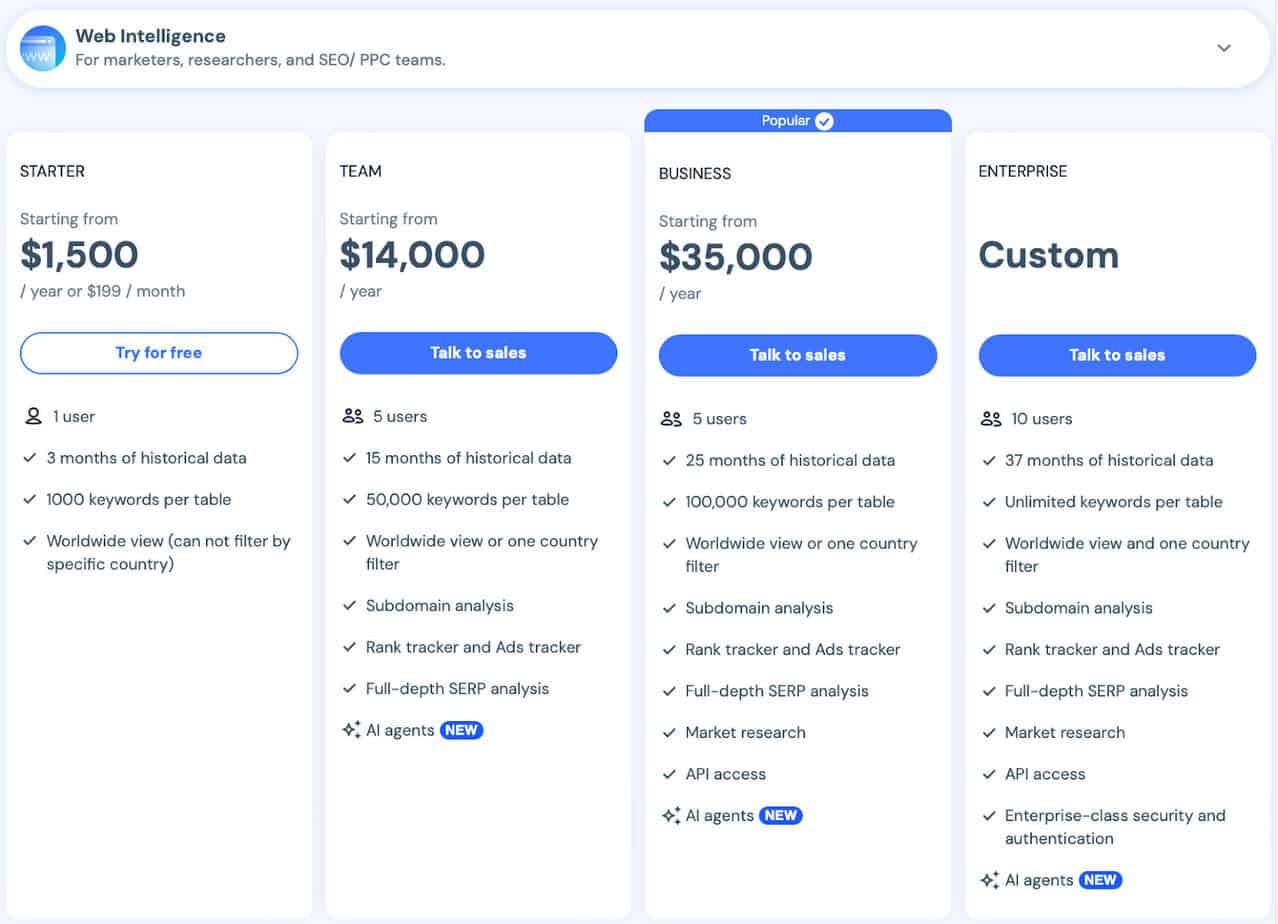
There’s also different pricing for Similarweb’s App Intelligence, Sales Intelligence, Shopper Intelligence, and Stock Intelligence tools. Pricing ranges from $129 per month to $15,000 per year or more, depending on the solution you choose.
Enterprise: Custom Plans
- Multiple users
- Unique visitors
- Industry analysis
- Keyword analysis
- Popular pages
- Mobile app engagement
- Desktop – mobile web split
- Global and country level data
- Up to 3 years of web traffic data
- Up to 28 months of mobile app data
- Up to unlimited results per metric
Expect starting pricing for enterprise plans in the $10k-$25k per year range.
Semrush Pricing
Sadly, Semrush doesn’t offer a free package. However, we were able to negotiate a 14 day extended trial for our readers using this link here.
Beyond that, the subsequent plans have been structured according to the standard market usage scales. There is one developed for startups, another with provisions for small and medium businesses, while the next is adequate for marketing agencies, and the costliest plan can be customized for enterprises.
Semrush has generously offered our readers a double extended fully featured FREE TRIAL. Play around with the suite for 2 full weeks to see if it's what you need!
But that said, you also have to choose the toolkit you want to use. These are Semrush’s toolkits:
- SEO
- Traffic & Market
- Local
- Content
- AI
- Social
- Advertising
Here are the details and pricing for the SEO Plan:
Note: At the moment, annual billing offers a 17% discount!
Pro Plan – For freelancers and startups. Costs $139.95 per month, or $117.33 per month if you choose the annual prepaid option.
- 5 programmed PDF reports
- Standard Semrush features
- Analyzes 100,000 web pages
- Monitors up to 500 keywords
- 5 projects
- 3,000 regular reports
- 10,000 results on each report
Guru Plan– For small and medium businesses, plus developing marketing firms. Costs $249.95 per month, or $208.33 per month if you choose the annual prepaid option.
- Branded PDF reports
- All Pro provisions
- Standard Semrush features
- Historical information
- 20 programmed PDF reports
- Analyzes 300,000 web pages
- Monitors up to 1500 keywords
- 50 projects
- 5,000 regular reports
- 30,000 results on each report
Business Plan– For big marketing agencies and businesses with an extensively large presence on the web. Costs $499.95 per month, or $416.65 per month if you choose the annual prepaid option.
- Product listing ads
- All Guru provisions
- Standard Semrush features
- Historical information
- Branded PDF reports
- 50 programmed PDF reports
- Analyzes 1,000,000 web pages
- Monitors up to 5,000 keywords
- 200 projects
- 10,000 regular reports
- 50,000 results on each report
In the Content Plan toolkit, you get access to the SEO Brief Generator, AI Article Generator, topic ideas, Content Optimizer, Integrations, and Reporting. This plan costs $60 per month.

You can also choose between various add-ons for the toolkits.
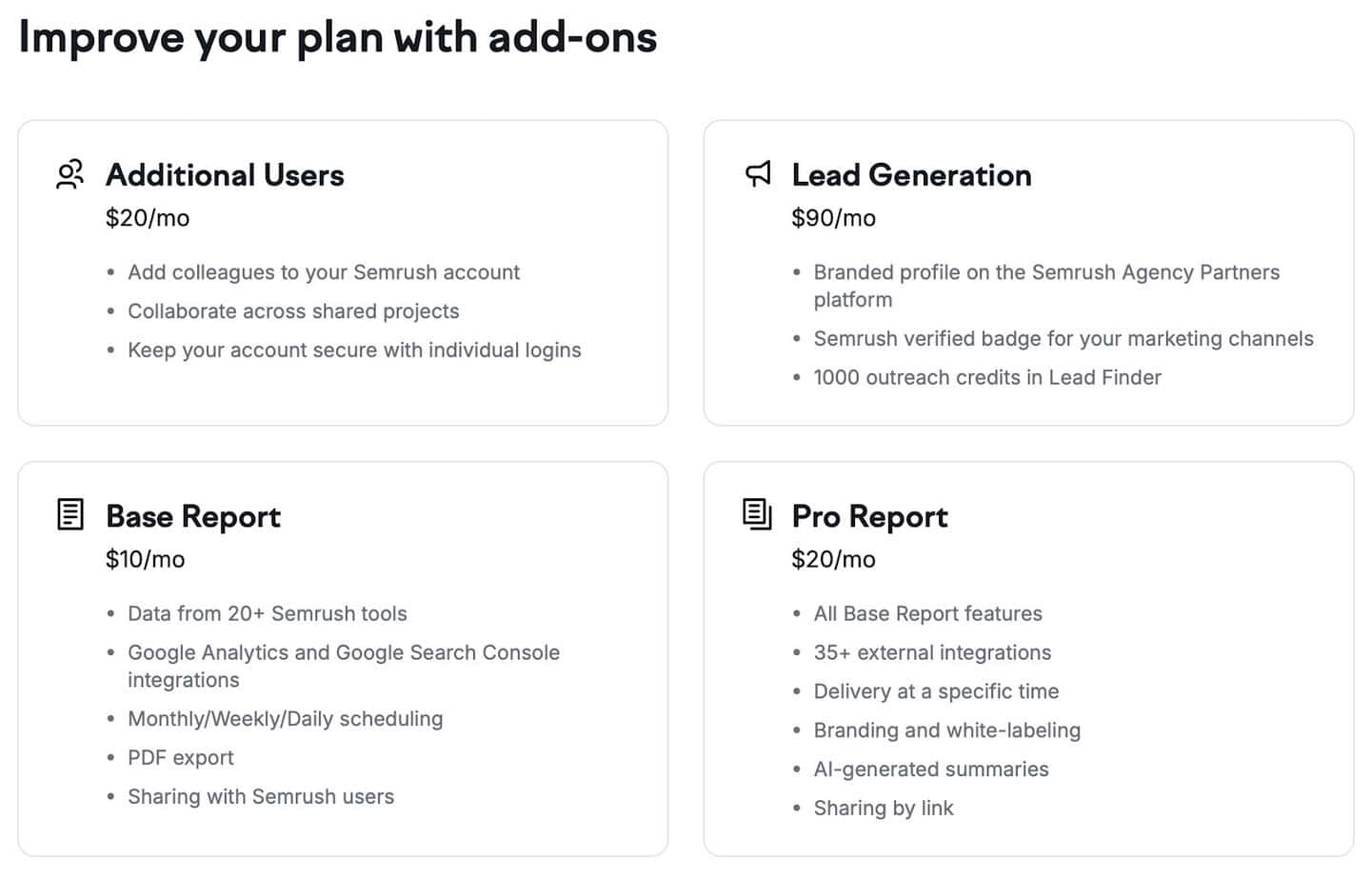
Enterprise package is personalized for large enterprises based on their respective needs. You need to contact Semrush for a demo and pricing.
- Limitless crawling
- Standard Semrush features
- Training on-site
- Customized keyword databases
- Customized limits
Verdict
SimilarWeb would be overwhelmingly preferred by beginners because of its free package, which is essentially practical for three months. Semrush’s free offer, on the other hand, is limited to 14 days.
It’s also commendable that SimilarWeb is willing to negotiate the price based on the specific features you choose to address your needs. Although Semrush has structured its plans according to popular usage patterns, they might feel static for users with special needs. Only the largest enterprises have the benefit of negotiating for custom provisions.
Semrush has generously offered our readers a double extended fully featured FREE TRIAL. Play around with the suite for 2 full weeks to see if it's what you need!
Final Verdict: Which Tool is Right for You?
For most SEOs, Semrush is the better option for keyword based research. Its suite of tools continues to expand with AI capabilities, enhanced competitor tracking, and deep keyword data. If you can take advantage of the 14-day trial for our readers here, it’s a no-brainer to at least test it out.
SimilarWeb excels in traffic benchmarking and digital market intelligence, but it comes at a higher cost and lacks tactical tools. That said, if you are an affiliate manager or ad buyer mapping market trends or targeting strategic partnerships, Similarweb might be a better fit here.
If you’re looking for SEO firepower, site audits, content strategy, and real-time competitive monitoring, SemrushSEMrush is the obvious winner. It’s built for SEOs, agencies, and marketers who need execution-ready insights.
If your team needs audience research, investor-grade web intelligence, or market-level data, SimilarWeb has you covered, just be ready for a sales process and enterprise pricing.

